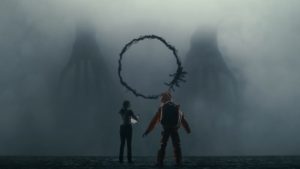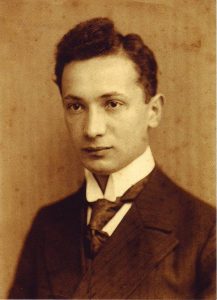The film Arrival has various correlations with Gadamer’s concepts of “play” and “genuine dialogue”. Throughout the film the protagonist, a language expert named Louise and a physicist named Ian are the only characters willing to engage in genuine dialogue with the Heptapods (the mysterious aliens of the film). At the beginning of the film there is an important exchange between Louise and Ian debating the cornerstone of civilization. Louise believes language is the cornerstone of civilization- while Ian believes its science; it could be argued that without language our ability to engage scientific endeavors would be hindered or halted all together. There are various factors throughout the film that that disrupt Louise and Ian’s ability to engage in genuine dialogue with the Heptapods. For a more direct comparison between the course materials, the Heptapods could be easily considered as the “other”. The armies’ job is protecting its citizens; unfortunately, they are under immense pressure to act once there is even the slightest notion of danger; we can see these tensions at various times throughout the film; and despite being rational to a degree the army without a doubt disrupts Louise and Ian’s ability to engage in this genuine dialogue. The media also plays a role in channeling fear into the citizens; which also increases pressure for the army, which further disrupts our protagonist’s ability. Gadamer’s notion of “play” is also vividly represented at one main point of the film. After Louise is struggling to gain any progress in communicating with the “other” she decides to take of her safety suit; risking contamination hoping to gain progress in a more creative and bold way. By taking off her suit she is able to progressively impact her relationship with the “other” by leaving herself open and vulnerable.
At first, I struggled to understand how the film was going to affect my various tutorial proposals. However, one notion that was expressed throughout the film that I realized could definitely impact my proposals can be called “outside factors”. These outside factors can be viewed as any sort of disruption that affects my ability to successfully perform my tutorial. In the film, the outside factors that disrupt Louise and Ian’s ability to engage in genuine dialogue is the army and media tensions. Although there may not be something as specific that may disrupt my tutorials there is always different type of disruption that can get in the way of any specific project. The outside factors I might face in my tutorials could be financial constraints and competition from other writers. Another way this film could help my progress in tutorials is by changing the way I view language as more than just a tool of communication. When script writing it’s important to carefully choose the words and expressions as cleverly and effectively as you can. This type of careful measure can correlate nicely to Gadamer’s notion of “play”; if we allow ourselves room for error we can progress our material in a more creative way, similar to how Banks was able to see the “other” in a new way and open up a new world.
In order for me to adapt to the new material discovered in Arrival I need to anticipate possible disruptions that I may face when attempting my tutorials before I may have to approach them. Financial constraints and a high degree of competition from rival writers may not be as severe as military protocol and media pressure faced by the doctors in the film; however, from my perspective they could be just as challenging. By anticipating and preparing for various disruptions, I have the ability to plan out strategies on how to deal with them well before I encounter them. When dealing with competition, learning about Gadamer’s notion of “play” I well attempt to progressively complete my product as uniquely and effectively as I can- to separate myself from various competitors.



